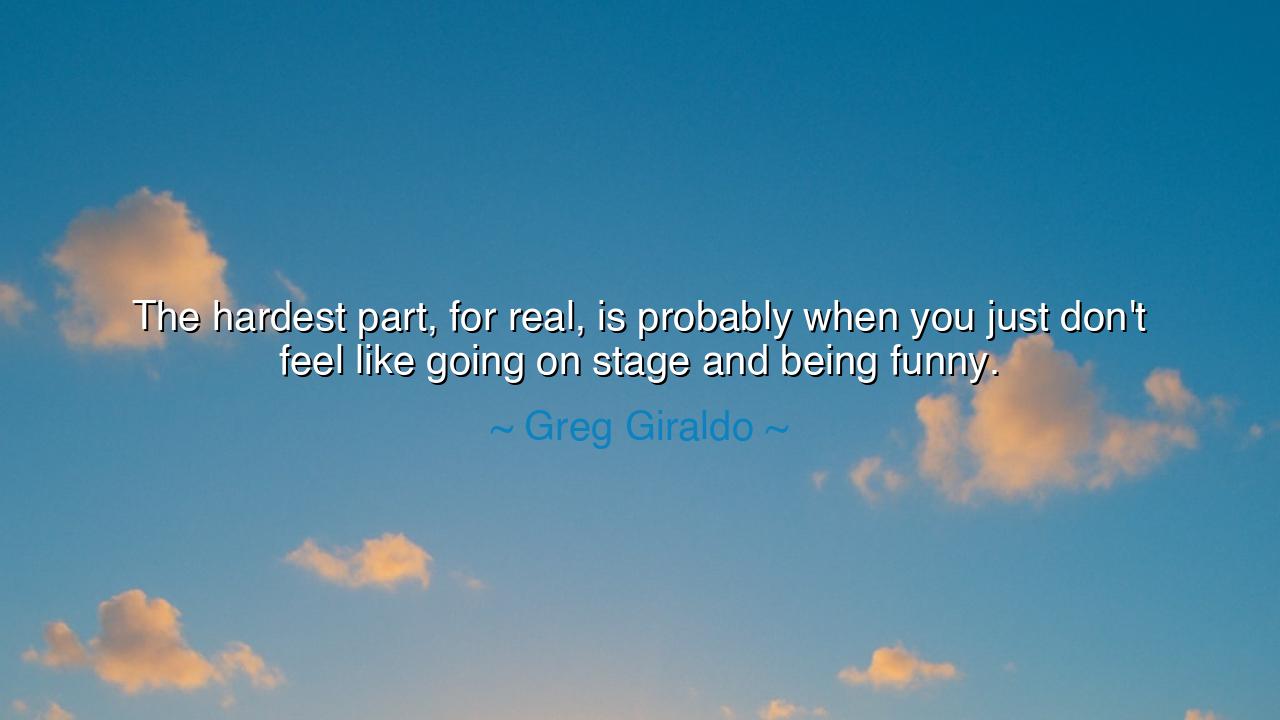
The hardest part, for real, is probably when you just don't feel
The hardest part, for real, is probably when you just don't feel like going on stage and being funny.






Hear, O seekers of truth and endurance, the words of Greg Giraldo, a man whose laughter concealed both wisdom and sorrow. He once said: “The hardest part, for real, is probably when you just don’t feel like going on stage and being funny.” At first glance, these words may seem like the sigh of a weary performer, but listen deeper—beneath them lies a truth known to every soul who bears the burden of light: that even the bringer of joy must sometimes battle darkness within. His words are not merely about comedy; they are about the struggle between duty and despair, between the face we show the world and the heart that trembles behind it.
For the comedian, unlike other artists, must wear his art upon his skin. The musician may hide behind melody, the painter behind his canvas, but the comedian stands naked before the crowd, his own spirit the instrument. To make others laugh when one’s own heart is heavy is no small act—it is a kind of heroism. Greg Giraldo, who wielded wit like a sword, knew this truth too well: that sometimes the act of being “funny” is not an expression of joy, but an act of defiance. It is the laughter that rises from the battlefield, the humor that mocks pain so that it cannot destroy us.
There is an ancient echo to this struggle. Consider Democritus, the philosopher of laughter. Though surrounded by war, corruption, and sorrow, he chose to laugh at the madness of men rather than weep for it. He was called “the laughing philosopher,” not because he found the world amusing, but because he understood that laughter is the soul’s shield against despair. So too did Giraldo laugh—not from ignorance of pain, but from intimacy with it. The hardest part, as he confessed, was not the art itself, but the courage to perform it when his spirit was weary.
And yet, his confession is universal. For who among us has not faced a day when we were expected to shine while feeling dim within? The teacher who must inspire though she is exhausted, the parent who must smile through worry, the worker who must serve through grief—all walk the same road. To stand before others and give light when one feels no fire is the truest test of strength. It is not falsehood—it is sacrifice. It is the act of love itself, for it says, “Even if I have nothing left, I will still give what I can.”
Giraldo’s words also reveal a tragic beauty: the burden of the healer. The jester of old, who made the king laugh, was often the loneliest man in the court. Yet he understood that laughter could heal wounds that no medicine could reach. The same is true today. Many who make the world laugh carry within them an unseen storm. But in stepping onto that stage, even when they “don’t feel like being funny,” they offer their suffering as a gift—transforming their private struggle into collective release. This is the sacred paradox of the comedian: through his own pain, others find peace.
Think, too, of Robin Williams, another soul of laughter who bore invisible sorrow. Like Giraldo, he gave himself wholly to the craft of joy, even when the weight of life pressed hard upon him. Both men remind us that laughter is not always born of happiness—it is often born of empathy. To make another laugh, one must first understand pain. Thus, when Greg spoke those words, he was not merely lamenting fatigue—he was revealing the cost of compassion.
Take this lesson, then, to heart: to bring joy when you feel none is one of the highest forms of courage. There will be times when your spirit falters, when the world demands light but your lamp feels empty. Do not despair. Step forward anyway. For in that act, you become something greater than yourself—a vessel through which grace flows. Remember that your struggle, your weariness, your hesitation, may yet serve others. When you stand before the world and give what little strength remains, you join the ranks of those who keep humanity alive through kindness and resilience.
So, children of the flame, when your heart is heavy and laughter feels far away, think of Greg Giraldo, who still went on stage. Think of every soul who smiled through pain so others might find hope. Do not wait until you feel strong to act with strength. Do not wait until you feel joy to offer joy. For sometimes, the divine spark reveals itself most brightly in those who burn in silence. And when you choose to rise despite the weight, you will discover—as Giraldo did—that even in exhaustion, your gift to the world can still be laughter, and through laughter, light.






AAdministratorAdministrator
Welcome, honored guests. Please leave a comment, we will respond soon